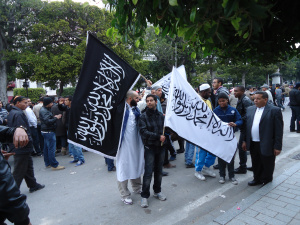Polarization of the anti-Islam film debate: undoing the Arab Spring? Part Two

Alongside the ideologically-driven agenda of the anti-Islam films that we explored in Part One, we should also not underestimate the political nature of the production and release of this film just before the 11th anniversary of 9/11 as well as before the American elections – in which Barack Obama is standing for a second term. Not only have such right-winged Christian groups reinforced the binary opposition ‘good’ Christian West versus the ‘evil’ Islamic East, they also profoundly dislike President Barack Obama – who has been depicted as ‘Satan himself’ as well as a ‘Muslim infiltrator’.
Moreover, these groups have also been radically opposed to the Arab Spring revolutions across the Middle East, fearing world domination by ‘radical Islamists’. Now that the Egyptian Muslim Brotherhood is indeed in government in Egypt, they are seeking to spread chaos, hatred and intolerance so as to undermine the Egyptian government and the wider Arab Spring movements. And, with these goals in mind, who to better target than the Prophet Muhammed himself? After all, this ensures that not just Muslims in particular countries are insulted but across the entire world, thus guaranteeing the ignition of ‘a fire’ somewhere. And once the fire is ablaze, it is subsequently used to prove the point the authors set out to make in the first place, namely that all Muslims are violent and irrational. Thus, Sadek has used the Egyptian protests to argue that “the violence that it [the film] has caused in Egypt is further evidence of how violent the religion and people are”. This essentialising and polarising discourse has also been forthcoming from other right-winged commentators such as Ayaan Hirshi Ali[i].
The problem with this discourse is that it locks the world in a vicious cycle of hatred and distrust as it creates radical oppositions. These oppositions are politically convenient not only for right-winged Christians, but also those working for the anti-Coptic Al-Nas television station in Egypt which aired the trailor of the film as well as other Salafi style groupings that are at the forefront of these protests (and do not represent the majority of Muslims). The sad thing is, however, that as these groups take centre stage in the public domain, the real issues disappear from sight. So, whilst the protests clearly display an anti-American sentiment, they do not address the reasons why – namely its unwavering support for Israel’s occupation of Palestine, the securitisation and militarisation of the entire region (including the propping up of dictatorial regimes) as well as the forced imposition of neoliberal economic policies which resulted poverty and despair. The protests also do not address the other difficulties the Arab Spring countries face, in for example areas of education, health care, food, water – as well as reform of political institutions. However, these issues are complex and difficult to resolve. Perhaps it is easier to vent one’s anger on simple black and white issues such as the insulting of the prophet. Yet, once the angered sentiments have dissipated these difficult issues facing Egypt and the Middle Eastern region still remain to be dealt with.
Hence, the difficult question emerges as to how to move away from a public debate in which two extreme ends fortify their positions and mutually constitute one another? How do we move away from a public sphere characterized by flag burning, rocket attacks and the throwing of insults towards a public sphere geared towards reaching understanding? The difficulty here is not only one of tempering the hotheaded sentiments regarding the content of the film, but rather also one of breaking through the institutional embedding of radical lobby groups within the public domain – lobby groups which deliberately move public discourses away from rational debate towards one of high sentiments and rocket-throwing. It is therefore important not to get caught up in the provocative claims of the film but rather note by whom this film is produced and with what political angle in mind. For, it is time to start looking beyond those binary positions, something which the Arab Spring (despite all its ongoing difficulties) had achieved as ordinary people emerged in the public domains and across global television screens as they demanded social, political, and economic rights. It really is time we try and leave this binary vision that has so dominated the 9/11 decade behind us – and focus on the social, political and economic rights that the people in the Middle East demand and deserve.
Please note: A longer and alternative version of this argument will shortly be published on opendemocracy.net.
Dr Vivienne Matthies-Boon is a Fellow of the Centre for Religion and Conflict in the Public Domain. She is also an Assistant Professor in International Relations at the University of Groningen. She specialises in Critical Theory, Middle Eastern Political Theory and Egyptian Politics.
[i] http://english.ahram.org.eg/NewsContentP/4/53036/Opinion/Violence-cannot-defend-Islam.aspx

